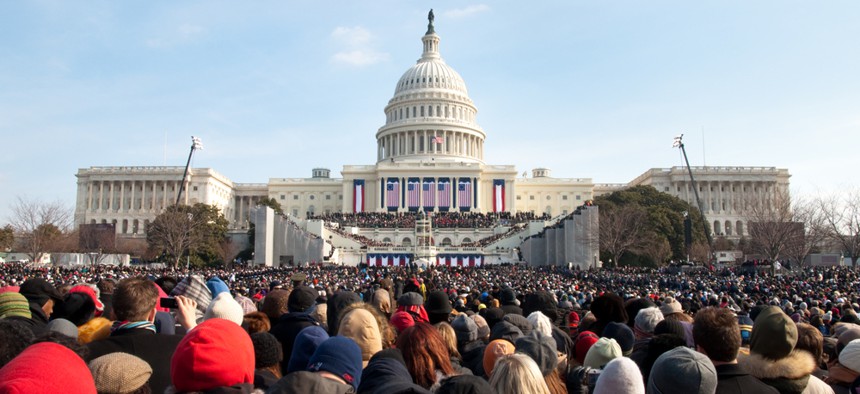
January 20, 2009: A crowd of warmly dressed onlookers attends the 2009 inauguration of President Barack Obama. Image via Ryan Rodrick Beiler/Shutterstock.com
The Second Term
Presidential encores have a reputation for being rocky. But there have been exceptions—and Obama’s new term could be one of them.
Second terms in the White House have, in many cases, ranged from the disappointing to the disastrous. Sick of the political infighting that intensified after his reelection, George Washington could hardly wait to retire to Mount Vernon. Ulysses S. Grant’s second term was plagued by political scandal and economic panic. Woodrow Wilson left office a broken man, having suffered a massive stroke during his failed crusade to persuade America to join the League of Nations. Republican Dwight D. Eisenhower was routed in his last political battle, leaving Democrats in control of the presidency, the House, the Senate, and the Supreme Court for nearly the rest of his life. More recently, Richard Nixon resigned in disgrace; Ronald Reagan was tarred by the Iran-Contra scandal; Bill Clinton was impeached; and George W. Bush watched helplessly as his opponents surged into both houses of Congress and then the White House.
(RELATED: A Guide to the Second Term: Presidential Transition Roadmap)
Hence the legendary “second-term curse.” In the early days of the republic, second-termers were by tradition discouraged from seeking another term, and nowadays, presidents are legally barred from a third term, thanks to the Twenty-Second Amendment. Popular wisdom has it that second-termers are therefore lame ducks. Unable to run again, how can a term-limited president reward his allies or restrain his adversaries? If he is seen as a fading force, won’t his allies hitch themselves to the next rising star? Won’t his adversaries attack relentlessly?
Fortunately for Barack Obama, the situation is not that bleak. For one thing, the idea of a second-term curse fails to account for basic probability. Most presidents fail in one way or another, and many nose-dive so fast that they never get a second term. Perhaps the “curse” is actually an example of what statisticians call “regression to the mean”: those presidents who beat the political odds in term one usually cannot maintain their lucky streak in term two. Nor does the curse account for several exceptional presidents whose authority increased following reelection. By looking at these two-term stars more closely, we can see how and why Obama might be more blessed than cursed.
From our nation’s founding to the present, politics has followed a tidal pattern. Once a party devises a new and successful electoral formula—a workable coalition that can consistently outnumber the opposition—that party tends to win, and keep winning, until eventually, the tide changes and the other party takes the lead. So far, U.S. history has seen four such reversals, each of which coincided with the election, and reelection, of an exceptional president. Yes, each of the four figures who presided over these great shifts—Thomas Jefferson, Abraham Lincoln, Franklin Roosevelt, and Ronald Reagan—had his share of second-term tribulations and catastrophes. (Lincoln, of course, died weeks after delivering his epic second inaugural address, and only days after Lee’s surrender.) But thanks to his own exceptional skills, as well as the fragility of the opposition party, each man forged a new electoral coalition that kept winning long after he left office.
Learn more about what to expect in the second term with the Government Business Council's (GBC) Presidential Transition Roadmap.






